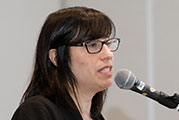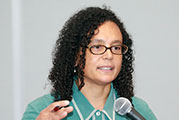APA is observing National Suicide Prevention Week from September 8 to 14 and World Suicide...
Highlights From APA Annual Meeting: Day Five
The final day of APA’s Annual Meeting featured an animated, case-based session on ECT and a review of strategies to help prevent suicide in youth. Experts also offered practical guidance on how to treat pregnant women with psychiatric conditions and important insights on why migrant children face a long, slow recovery when they are separated from their families.
Look for future coverage of APA’s 2019 Annual Meeting in upcoming issues of Psychiatric News.
Increasing suicide rates among adolescents call for immediate approaches to reducing the risk. Michele Berk, Ph.D., offers seven practical tactics that parents and psychiatrists can use today.
Read More >
In a lively, interactive session on Wednesday participants debated patients most likely to benefit from ECT, how to place electrodes, and whether to use lithium before and after treatment. Read More >
Four perinatal psychiatry experts remind that treatment during pregnancy requires a risk-risk discussion with women: the risks of treating versus not treating.
Read More >
Applying machine learning and other technologies to better understand risk factors for suicide were among the topics addressed by NIMH director Joshua Gordon, M.D., Ph.D., during the 175th History Track session.
Read More >
Building trust is an important first step to helping migrant children separated from parents begin a path to recovery, says child trauma expert Alicia Lieberman, M.D. Read More >
While some studies show DBS to be effective, experts warn against “therapeutic enthusiasm,” saying the body of evidence does not sufficiently support the treatment. Read More >
Experts explore how upstream social institutions and policies on homelessness and incarceration can drive downstream breakdowns in the delivery of public mental health services. Read More >
Be sure to save the date for next year's Annual Meeting, April 25 through 29, 2020, in Philadelphia, the city where APA was founded.
Look for future coverage of APA’s 2019 Annual Meeting in upcoming issues of Psychiatric News.
Expert Outlines Practical Tactics Parents, Practitioners Can Use to Help Teens Overcome Suicidal Urges
 |
Read More >
Panelists Discuss Difficult ECT Questions, From Patient Selection to Treatment Completion
 |
Nine Tips for Managing Psychiatric Conditions Before, During, and After Pregnancy
 |
Read More >
NIMH Research Seeks to Harness Power of Technology, says Gordon
 |
Read More >
Considerations for Treating Migrant Children Separated From Parents
 |
Panel Questions Evidence on Deep Brain Stimulation for Depression
 |
From Patient to Inmate: Session Highlights Complex Interactions Between Social Policies and Mental Health Care Delivery
 |
Join Us Next Year in Philadelphia
 |





